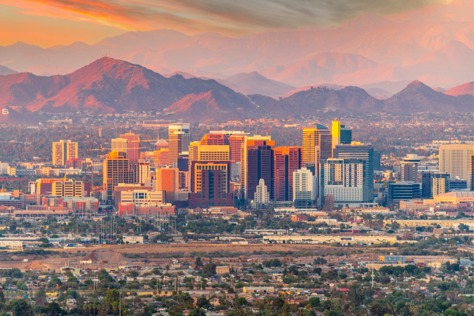Phoenix is known for its abundance of outdoor activities, art scene and museum culture, and its infamously hot weather. Professional sports are another big part of living in Phoenix, as the city hosts teams in all four professional sports leagues. Phoenix has also seen a lot of growth recently, ranking number nine on the top inbound cities people were moving to in 2020. If you’re looking at Phoenix for your next move, this guide can help you know what to expect from the Valley of the Sun.
1. Cost of Living in Phoenix
Phoenix is a great financially friendly city to live in, despite its size and growth. The cost of living is 5% lower than the national average, according to Payscale. Phoenix does have an 8.6% sales tax, which is higher than the Arizona state average of 5.6%. Here are some price ranges you can expect in Phoenix:
- Housing price: $330,344
- Rent: $1,035
- Storage: $44 - $309
- Doctor’s visit: $108.16
- Dentist’s visit: $92.92
- A gallon of milk: $1.89
- A loaf of bread: $3.24
- A carton of eggs: $1.76
Many factors can influence some of these prices. You can use a cost of living calculator to better understand what you may spend as a Phoenix resident.

2. Neighborhoods in Phoenix
Phoenix has a population of 1.6 million, making it the fifth-largest major city in the United States. Some of the most popular neighborhoods in this metropolis include:
Paradise Valley
Paradise Valley is considered the most affluent suburb in Phoenix. This town is known for its dining, shopping, and luxury golf courses. This town is home to many retirees.
Arcadia
Arcadia is an up-and-coming part of Phoenix, with boutique shops, restaurants, pubs, and parks. Public schools are also rated highly in Arcadia, which is within the Scottsdale school district.
Tempe
The Tempe Center of the Arts hosts concerts, dances, and comedy shows. Tempe is also home to Wells Fargo Arena, which hosts many sporting events and concerts. There are also several parks, gardens, and outdoor recreational areas in Tempe.
Glendale
Glendale is home to Sahuaro Ranch Park, which is a part of the National Register of Historic Places. Thunderbird Park is also in Glendale, which has over 1,000 acres of desert preserve which makes it a great place for hikers and bikers. Glendale is one of the most affordable places in Maricopa county, as housing prices are 13% lower than the national average.
Phoenix isn’t just large in terms of population — suburbs and neighborhoods are spread across miles, and it may take some getting used to for new residents or visitors to get familiar with the highway system connecting them all. For this reason, as well as for the convenience of being able to travel unburdened to look for housing or tour homes, you may wish to find local storage in Phoenix upon arrival. Climate-controlled units are available in neighborhoods like Gilbert and Surprise, as well as on convenient major roads around the area including Baseline Road and Happy Valley Road.
3. Phoenix Job Market
The Bureau of Labor Statistics reported the average hourly wage for workers in the Phoenix metropolitan area in 2019 to be $25.16. This well exceeds the calculated living wage required for a single individual to live comfortably in Phoenix. According to Arizona at Work, some of the most in-demand industries in the city of Phoenix include:
- Construction;
- Administration and professional services;
- Technology;
- Transportation;
- Healthcare and social services;
The unemployment rate in the metro Phoenix area is 6.3%, which is comparable to the national average as of January 2021. Arizona at work projects a 2.6% employment growth throughout the state of Arizona through 2021. This projected growth can mean more job opportunities for people looking to move to Phoenix.


4. Things to Do in Phoenix
Phoenix has a wide variety of museums, parks, golf courses, and other attractions. The Valley is also known for southwestern and Mexican cuisine, utilizing the flavors of the desert. Here are some of the most popular spots in Phoenix:
Parks and Attractions
Arizona ranks 5th most national parks in the nation, with three in Phoenix alone. Many of these attractions are family-friendly and give you a unique Phoenix experience:
- Camelback Mountain;
- Desert Botanical Garden;
- Heard Museum;
- Troon North Golf Club;
- Children’s Museum of Phoenix.
Food and Dining
Many of these restaurants were ranked the best in the city by Phoenix New Times:
5. What to Know Before You Move to Phoenix
There are many great and unique things about Phoenix, but just like any new place, it’s helpful to be prepared for some of the new things you’ll encounter:
- Weather: Arizona is famous for extremely hot weather in the summer. When moving to Phoenix, you should expect temperatures up to 110 degrees in August. Because of the extreme heat, you’ll want to make sure to take proper summer preparations. This may include seasonal storage for your vehicles, taking extra care of your pets, and increasing your sunscreen usage when you go outside.
- Water conservation: Due to the desert climate, water conservation in Phoenix is a popular and necessary practice. Because of this, you may see less traditional grass yards and more rock gardens in front of people's homes, as well as higher residential water bills. The city of Phoenix encourages the water conservation of residents, and has different city-sponsored water management programs.
- Transportation and traffic: Phoenix does have public transit in the downtown area in the form of the Valley Metro, which you can buy per-day, per-week, or annual passes for. However, driving is the most popular mode of transportation for those living in Phoenix. Phoenix drivers experience some of the quickest times between miles during rush hour periods. However, traffic is known to increase during the winter months, and commutes tend to be longer in this city due to its sprawling layout.
- Scorpions: New Phoenix residents should watch out for these insects. Scorpions are found in pockets scattered around phoenix, so you may or may not have a problem with them in your neighborhood. To mitigate scorpion risk, you can invest in blacklight — scorpions glow under blacklights, so they can be identified in clothing, crawl spaces, and other hiding spots. You may also want to keep a first aid kit able to treat a scorpion sting in your home or vehicle.
Making a big move can be a huge commitment. Understanding your new environment can help make moving easier, and help you settle into your new place.









